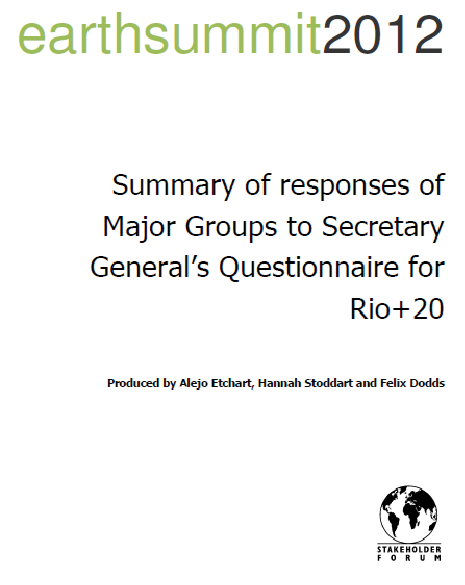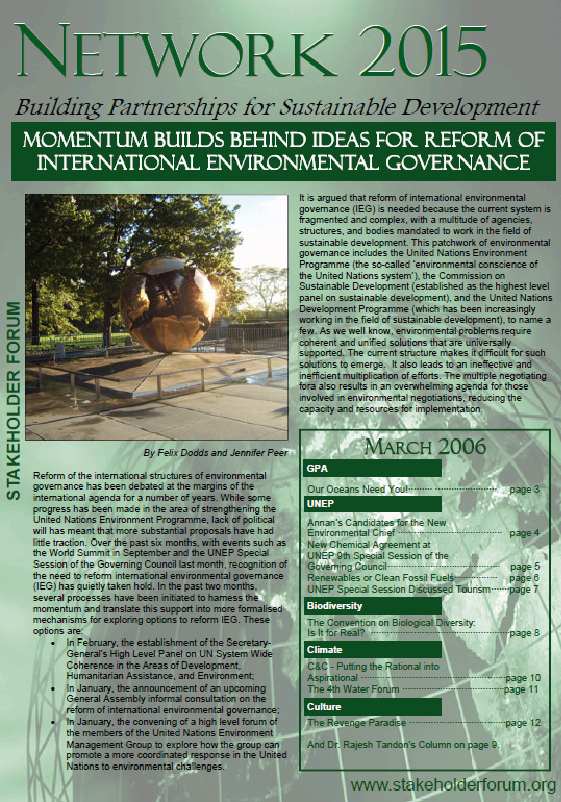Dear Aubrey
Count us in.
Warmest regards
Felix
Felix Dodds
Executive Director
Stakeholder ForumCarrying Capacity and Ecological Limits - Living within the carrying capacity of the Earth, recognition of the achievement of basic needs and livelihoods framework of contraction and convergence guaranteeing geopolitical stability.
Earth Partners Foundation and Stakeholder Forum - Rio+20
The green economy must contribute to the goals of sustainability. The overarching goal of the green economy should be defined in the context of a fair and socially just economic system that meets the needs of all people within the ecological carrying capacity of the planet. The green economy needs to be a new economy, with new models, mindsets and metrics based on a systems approach. Issues such as poverty, climate change, soil erosion, and the loss of biodiversity are emergent properties of unsustainable consumption and production patterns. In order to address the root causes of these symptoms, a holistic—or systems—approach to problem solving is necessary. The green economy must be an economy that moves away from the destructive economic expansion paradigm (at least in rich countries where per capita eco-footprints are above sustainable levels) to one that recognizes ecological limits and that enables people to meet their basic needs, along a global framework of ‘contraction and convergence’. We must transform the nature of our impact on the world’s ecological systems. This will mean using innovation to shift from linear patterns - that consume resources and produce wastes – to cyclical patterns where our actions contribute to ecological and social resilience. This will involve reshaping our identity and recognizing humanity’s potential to support our planet and ensure that it thrives.
One Earth - Rio+20
Carrying Capacity and Ecological Limits - Living within the carrying capacity of the Earth, recognition of the achievement of basic needs and livelihoods within ecological limits, and a move away from economic expansion, especially in developed nations, under a framework of contraction and convergence guaranteeing geopolitical stability. This policy recommendation was put forward in relation to the Green Economy in the context of Sustainable Development and Poverty Eradication for the Earth Summit 2012 by One Earth, Stakeholder Forum and EPF.
Green Economy
In the Context of Sustainable Development and Poverty Eradication
The human economy emits vast amounts of greenhouse gas by burning oil, coal and gas. The sharply increasing volume of these emissions is accumulating in the atmosphere, accelerating the rise in their atmospheric concentration. This traps more heat-energy from the sun and dangerous rates of climate change with devastating damages are in prospect. As Jim Lovelock suggested, failing to stem this trend means civilization may be completely overwhelmed during the decades ahead.To avoid this we have to solve the problem faster than we create it. Globally, we have to achieve the goal of the United Nations Framework Convention on Climate Change (UNFCCC) agreed in 1992, by drastically cutting greenhouse emissions. The agreed objective of the UNFCCC is the stabilisation of greenhouse gas concentration in the global atmosphere at a level that is ‘safe’. These cuts – or the international emissions “Contraction and Convergence” (C&C) [see below] – are required by definition.
C&C is like turning off the taps to a bath that is about to overflow. Merely hoping to do this, or as bureaucrats say, being ‘aspirational’ about this, is deluded. In the analogy the atmosphere is the bath, the emissions are the taps and the impending overflow is what will wash civilization away unless we replace hope with C&C.
After fifteen years of aspirational politics, the taps are open wider than ever and the bath is nearly full. The global quarrel about who should turn off a tap first continues. The Kyoto Protocol mediates this by restricting some emissions measured in millions of tonnes, while ongoing global emissions accumulate in the atmosphere in billions of tonnes. The result is that concentrations, temperature and damages are now rising faster than ever. Worse, the atmosphere now appears to be retaining a larger fraction of each year’s emissions than the historic average of 50% and this, due to failure of the natural sinks for the gases, seems set to increase. As we continue to accelerate the problem much faster than we act to resolve it, Kyoto is kerb-crawling and Jim’s pessimism is justified.
C&C - PUTTING THE RATIONAL INTO ASPIRATIONAL
Network 2015
Stakeholder Forum





